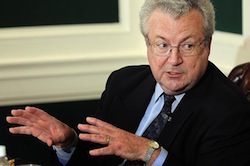 According to former president of Shell Oil, John Hofmeister, Americans will be paying $5 per gallon for gas by 2012 due to growing demand for oil, tighter supplies and inadequate responses by the U.S. government. His remarks were made during his appearance on Platts Energy Week television.
According to former president of Shell Oil, John Hofmeister, Americans will be paying $5 per gallon for gas by 2012 due to growing demand for oil, tighter supplies and inadequate responses by the U.S. government. His remarks were made during his appearance on Platts Energy Week television.
Not necessarily news Americans want to hear as gas prices have been on the rise for the past few weeks and the worst recession in decades holds on as the country makes preparations for the new year.
Hofmeister also predicted that little or no new drilling would take place in the deep waters of the Gulf of Mexico for the next two years as Washington still tries to find the adequate response to the BP oil spill. However, drilling new wells would not bring about an immediate relief to high gas prices as it takes years to bring new wells into production.
“If we stay on our current course, within a decade we’re into energy shortages in this country big time,” said Hofmeister, who retired from Shell in 2008 and now heads a grass-roots group called Citizens for Affordable Energy.
“Blackouts, brownouts, gas lines, rationing–that’s my projection based upon the current inability to make to make decisions,” Hofmeister said during the program. “The politically driven choices that are being made, which are non-choices, essentially frittering at the edges of renewable energy, stifling production in hydrocarbon energy–that’s a sure path for not enough energy for American consumers. When American consumers are short or prices are so high–$5 a gallon for gasoline, for example, by 2012–that’s going to set a new tone. It’s going to be panic time for politicians. They’re suddenly going to get the sense that we better do something.”
 Hofmeister, whose interview was taped December 1 during a Platts Global Energy Outlook Forum in New York, said he expected the result of the November elections will worsen political gridlock in Washington. In November, voters overwhelmingly gave Republicans control of the House of Representatives and more seats in the Senate in the 112th Congress that convenes in January 2011.
Hofmeister, whose interview was taped December 1 during a Platts Global Energy Outlook Forum in New York, said he expected the result of the November elections will worsen political gridlock in Washington. In November, voters overwhelmingly gave Republicans control of the House of Representatives and more seats in the Senate in the 112th Congress that convenes in January 2011.
“The 112th [Congress] has potential for compromise, but we’ll see,” said Hofmeister. “I’m predicting actually a worse outcome over the next two years, which takes us to 2012 with higher gasoline prices, uncertainty as to the future of hydrocarbons, more regulation on the hydrocarbon industry based on who the administration is today,” he said. “And what I fear the most is that by 2012 prices will be so high that we’ll have a backlash from the electorate and we’ll go into reverse and will go back to as hydro-carbon only type of future with maybe some nuclear, instead of moving on into the 21st century.”
Earlier this year, Hofmeister published a book, “Why We Hate Oil Companies: Straight Talk from an Energy Insider.” One of his recommendations includes a government agency modeled after the Federal Reserve to development national energy policy. During his Platts Energy Week interview, he said that while the idea is generally dismissed in Washington as politically unfeasible, it may take hold once global competition for oil and other energy supplies grows intense.
“That will be the game changer,” he said. “That will mean the current governmental system which incorporates politics into every energy decision has to be pushed aside by the independent regulatory approach which I’m promoting.”

